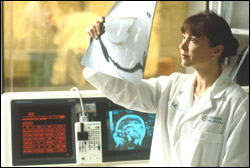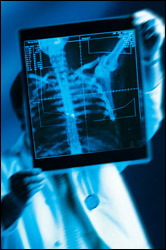
|
The physicians and staff at Florida Oncology Network are committed to providing the
best care possible in a caring and supportive environment. We know that for many of
our patients and their families this can be a very difficult in their lives. This
section will provide you with useful information regarding our services and radiation therapy.
New Patients
When you or your referring doctor call to schedule your first appointment,
you will be directed to one of our New Patient Coordinators based at each
of our office locations. Our New Patient Coordinator will need to know the
name of your referring physician, the reason for your referral (diagnosis),
and demographic and insurance information. We will assist you in gathering
your medical records for your first visit and in obtaining an authorization
for your visit, if needed. At your first visit, you will be asked to fill
out your new patient paperwork prior to seeing the physician. After your
appointment, your radiation oncologist will notify your referring physician
of his findings and treatment recommendations.

Telephone and After-Hours Calls
When calling our offices during normal hours, your call will be answered by
one of our receptionists who will greet you and direct your call. We have
multiple incoming lines that are always answered by a live person, not a recording.
Because most patients object to having their physician visit interrupted by
phone calls, generally patient calls are handled by the staff. Our nurses are
highly capable in answering most treatment-related questions. The nurses do
utilize voice mail when occupied by direct patient care or teaching. If this
occurs, your call will be returned promptly. In the event of emergency, please
call 911 or go to the nearest emergency room.
We do have an answering service to take your call after normal office hours.
They will forward all messages to the on-call physician. Your call will be
returned at the doctor's earliest convenience.

Prescriptions and Renewals
It is very helpful if you bring a complete list (or the bottles) of all your medications
with you at the time of your first visit. All prescriptions and authorizations for renewals
should be requested during normal office hours. Please have your pharmacy phone number
available when requesting your medication. It is difficult for us to refill prescriptions
at night or on weekends, since your medical records are not readily available to our doctor
on-call. In general, we do not approve refills if it has been more than one year since your last visit.

What is Radiation Therapy?
Radiation is a special type of energy carried by waves or a stream of particles.
It can come from radioactive substances and special machines. There are many different
types and levels of radiation energy. We all have been exposed to low levels of radiation
energy, such as that from the sun or radiation used to produce a chest x-ray or mammogram.
When radiation energy is used at high levels, it can treat cancer and other illnesses.
One way to fight cancer is to interfere with cancer cells' ability to multiply. Radiation,
used at high doses, causes changes in cancer cells which stop their ability to multiply and
eventually kills them. The use of high-energy rays or particles to treat a disease is called
radiation therapy. Radiation therapy may be used alone or in combination with surgery,
chemotherapy, and/or biological therapy. It may be used in an attempt to cure the cancer
or to treat unpleasant symptoms the disease may be causing, such as pain or bleeding.
Radiation therapy is used to treat a wide variety of malignant and non-malignant diseases.
Types of Radiation Treatments
Radiation therapy may be given in three general ways:
- External beam treatment
Radiation is delivered to a specific area of the body using a large, highly
sophisticated machine. Treatment is usually given once daily, Monday
through Friday, for 1 to 8 weeks depending on the type of cancer and the
purpose of the treatment. In certain circumstances, treatment may be given
twice a day, or given less frequently than fives days a week. Specialized,
advanced forms of external beam irradiation include intensity modulated
radiotherapy (IMRT), 3-dimensional conformal radiotherapy (3-D
CRT), Gamma KnifeTM radiosurgery, and fractionated stereotactic
radiotherapy.
- Brachytherapy
Single or multiple sources of radiation (usually in the shape of small seeds or
needles) are implanted or inserted in the body. This technique is a very
effective means of giving a high dose of local irradiation to the tumor and
often is combined with external beam irradiation. Brachytherapy is
commonly used in cervical, uterine, and prostate cancers,
some head and neck cancers, and sarcomas. Brachytherapy is also
effective in treating certain non-cancerous conditions, such as coronary artery
restenosis or ptyerygia. Depending on the technique used, the
brachytherapy implant may remain in place a few minutes, a few days, or
permanently.
- Radionuclide treatment
Radionuclide therapy involves the use of
unsealed radioisotopes for the treatment of disease. Examples include radioactive iodine (I-131)
for the treatment of thyroid cancer and hyperthyroidism and the use of QuadrametTM (Sm-153)
or MetastronTM (Sr-90) for the treatment of bone metastases.
A very exciting, emerging technique is radioimmunotherapy (or radiolabelled antibody treatment),
in which a radioactive particle is attached (or chelated) to a tumor cell-specific antibody.
The agent circulates throughout the body and selectively binds with the targeted cancerous cells,
thereby delivering high-dose, specifically-targetted radiation.

Your Radiation Oncology Team
A team approach is essential for achieving best patient care.
A radiation oncologist is a physician who has completed
a residency in the specialized field of radiation oncology.
This physician is responsible for determining the role of radiation
therapy in a patient's care, planning the treatment, and evaluating
the patient's response to the treatment.
The medical physicist and dosimetrist are key in assisting
the radiation oncologist develop the treatment plan. They are
responsible for designing the immobilization devices, generating
the computer treatment plan, calculating the dose of radiation,
and conducting weekly checks to make sure treatment is being
given accurately and safely.
Radiation therapists are responsible for the simulation (or pretreatment planning)
procedure and the daily treatments. Each day they carefully position the patient
for treatment, ensure that the radiation field is accurate, and deliver the treatment.
They work closely with the radiation oncologist to identify any shifts or changes
in the field before the daily treatment is administered.
|
Oncology nurses are responsible for coordinating all of the patient's care both
during and after treatment, such as assisting the physician with making
appointments, evaluating symptoms related to the treatment, and initiating
referrals, as needed, for social services and nutritional evaluations. In addition,
they provide patient and family important education regarding treatment and side
effects, medications, and long-term planning.
Social workers provide invaluable assistance for patients and their families
regarding the many avenues of financial, counseling, transportation, and support
group assistance that are available to those affected by cancer.
|

|

Side Effect Management
Depending on the specifics of your cancer type, extent of disease, and whether
other treatment modalities (such as surgery or chemotherapy) are required, you
may experience some side effects during and after your radiotherapy treatment.
Your physician and nurses can offer much useful advice in helping to reduce the
likelihood of developing these symptoms and, if any should occur, minimizing their severity.
Conjunctivitis
Constipation
Cystitis (Bladder Irritation)
Diarrhea Management
Dry Mouth
Esophagitis
Loss of Appetite
Mucositis (Oral Cavity Irritation)
Nausea
Taste Problems
Skin Care - during treatment
Skin Care - after treatment

|
|






